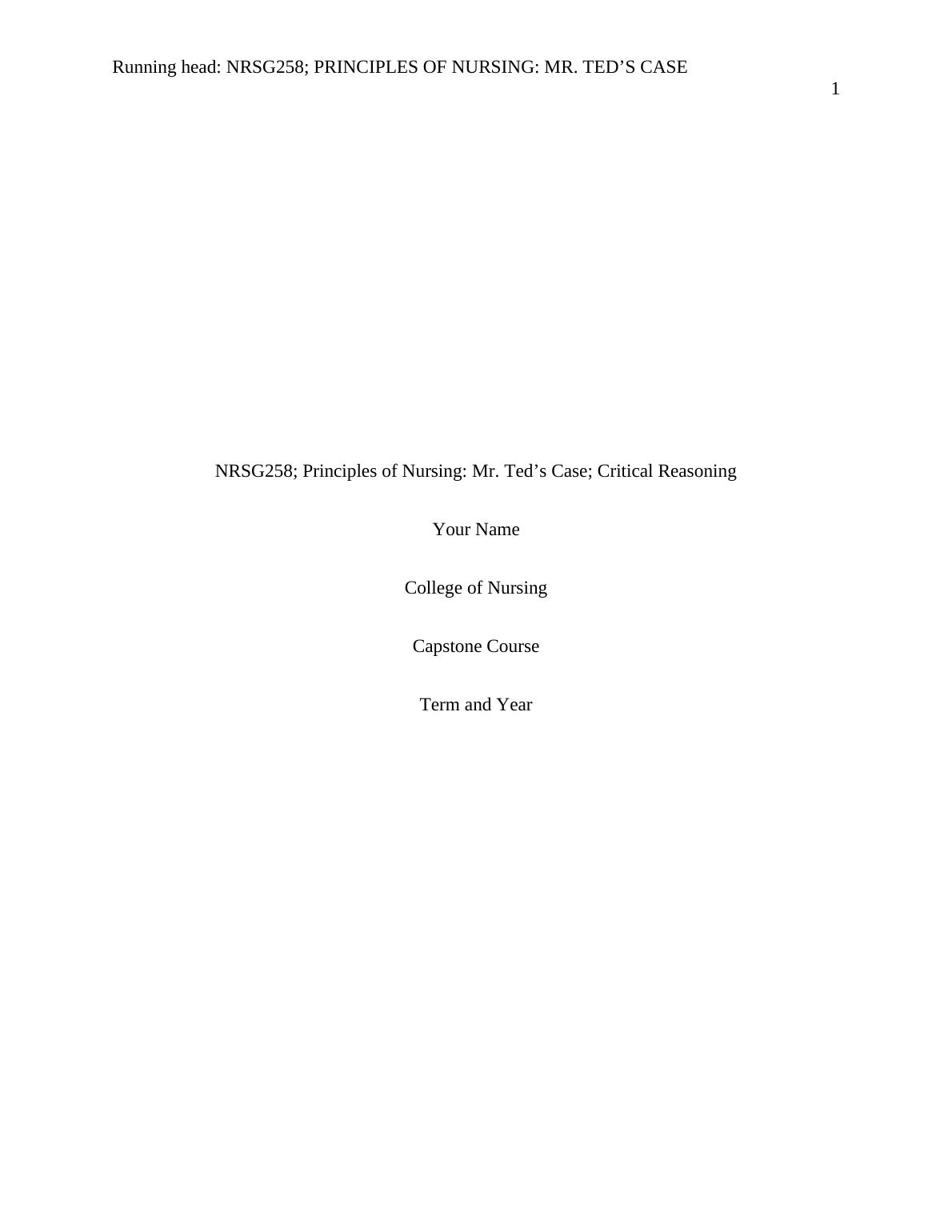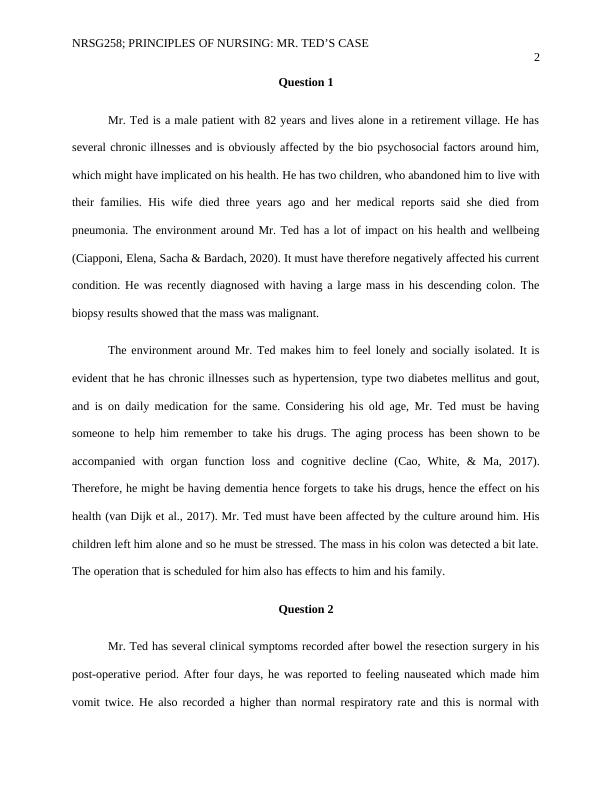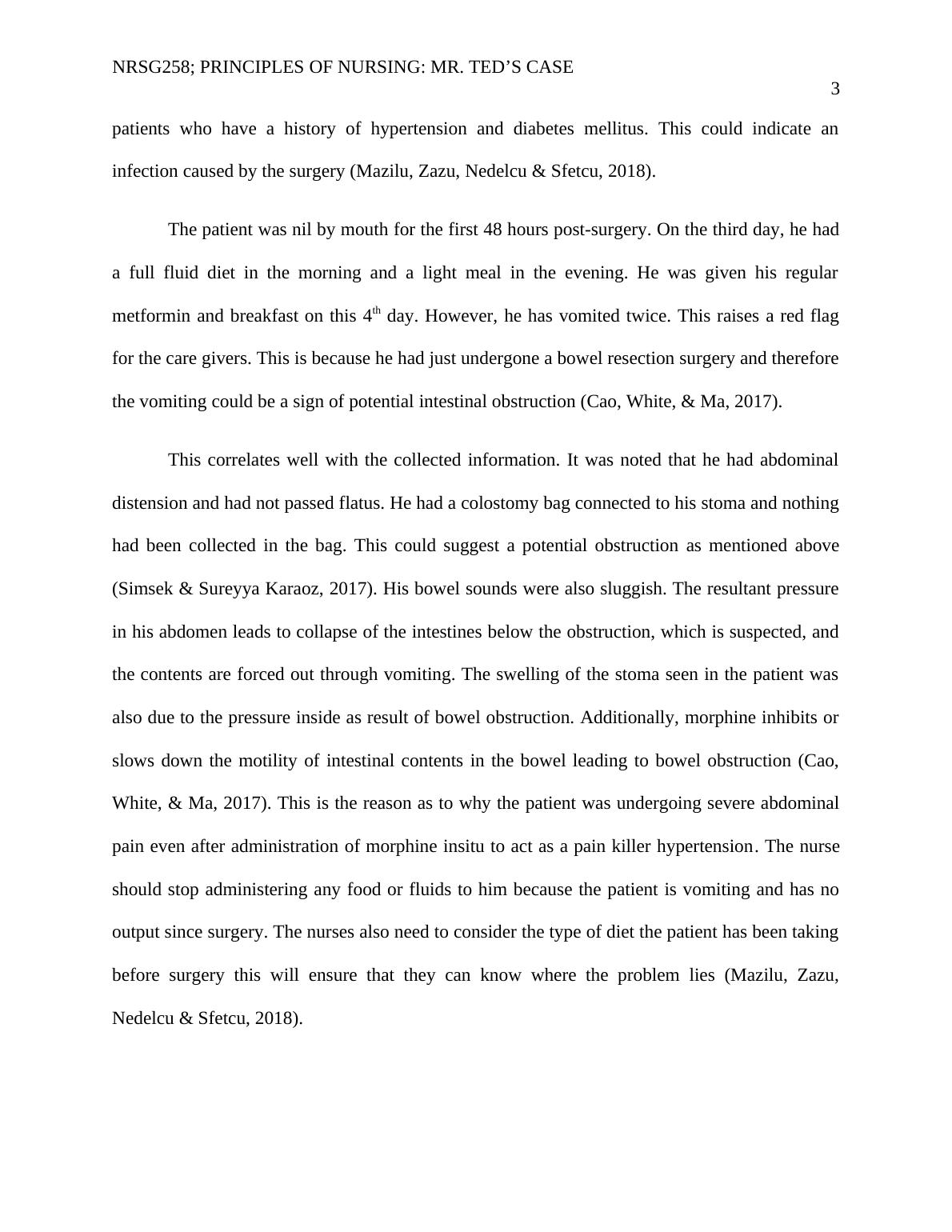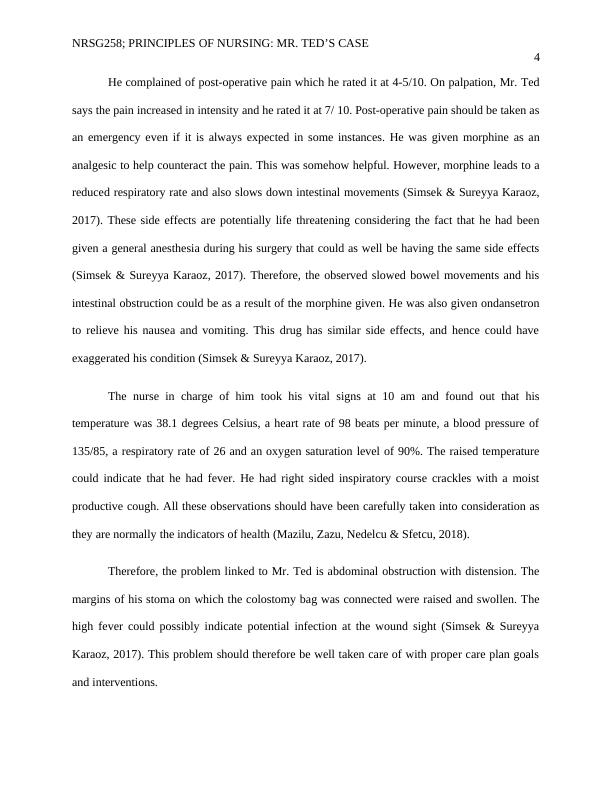Principles Of Nursing And Ethics
Added on 2022-07-29
11 Pages2943 Words25 Views
Running head: NRSG258; PRINCIPLES OF NURSING: MR. TED’S CASE
1
NRSG258; Principles of Nursing: Mr. Ted’s Case; Critical Reasoning
Your Name
College of Nursing
Capstone Course
Term and Year
1
NRSG258; Principles of Nursing: Mr. Ted’s Case; Critical Reasoning
Your Name
College of Nursing
Capstone Course
Term and Year

NRSG258; PRINCIPLES OF NURSING: MR. TED’S CASE
2
Question 1
Mr. Ted is a male patient with 82 years and lives alone in a retirement village. He has
several chronic illnesses and is obviously affected by the bio psychosocial factors around him,
which might have implicated on his health. He has two children, who abandoned him to live with
their families. His wife died three years ago and her medical reports said she died from
pneumonia. The environment around Mr. Ted has a lot of impact on his health and wellbeing
(Ciapponi, Elena, Sacha & Bardach, 2020). It must have therefore negatively affected his current
condition. He was recently diagnosed with having a large mass in his descending colon. The
biopsy results showed that the mass was malignant.
The environment around Mr. Ted makes him to feel lonely and socially isolated. It is
evident that he has chronic illnesses such as hypertension, type two diabetes mellitus and gout,
and is on daily medication for the same. Considering his old age, Mr. Ted must be having
someone to help him remember to take his drugs. The aging process has been shown to be
accompanied with organ function loss and cognitive decline (Cao, White, & Ma, 2017).
Therefore, he might be having dementia hence forgets to take his drugs, hence the effect on his
health (van Dijk et al., 2017). Mr. Ted must have been affected by the culture around him. His
children left him alone and so he must be stressed. The mass in his colon was detected a bit late.
The operation that is scheduled for him also has effects to him and his family.
Question 2
Mr. Ted has several clinical symptoms recorded after bowel the resection surgery in his
post-operative period. After four days, he was reported to feeling nauseated which made him
vomit twice. He also recorded a higher than normal respiratory rate and this is normal with
2
Question 1
Mr. Ted is a male patient with 82 years and lives alone in a retirement village. He has
several chronic illnesses and is obviously affected by the bio psychosocial factors around him,
which might have implicated on his health. He has two children, who abandoned him to live with
their families. His wife died three years ago and her medical reports said she died from
pneumonia. The environment around Mr. Ted has a lot of impact on his health and wellbeing
(Ciapponi, Elena, Sacha & Bardach, 2020). It must have therefore negatively affected his current
condition. He was recently diagnosed with having a large mass in his descending colon. The
biopsy results showed that the mass was malignant.
The environment around Mr. Ted makes him to feel lonely and socially isolated. It is
evident that he has chronic illnesses such as hypertension, type two diabetes mellitus and gout,
and is on daily medication for the same. Considering his old age, Mr. Ted must be having
someone to help him remember to take his drugs. The aging process has been shown to be
accompanied with organ function loss and cognitive decline (Cao, White, & Ma, 2017).
Therefore, he might be having dementia hence forgets to take his drugs, hence the effect on his
health (van Dijk et al., 2017). Mr. Ted must have been affected by the culture around him. His
children left him alone and so he must be stressed. The mass in his colon was detected a bit late.
The operation that is scheduled for him also has effects to him and his family.
Question 2
Mr. Ted has several clinical symptoms recorded after bowel the resection surgery in his
post-operative period. After four days, he was reported to feeling nauseated which made him
vomit twice. He also recorded a higher than normal respiratory rate and this is normal with

NRSG258; PRINCIPLES OF NURSING: MR. TED’S CASE
3
patients who have a history of hypertension and diabetes mellitus. This could indicate an
infection caused by the surgery (Mazilu, Zazu, Nedelcu & Sfetcu, 2018).
The patient was nil by mouth for the first 48 hours post-surgery. On the third day, he had
a full fluid diet in the morning and a light meal in the evening. He was given his regular
metformin and breakfast on this 4th day. However, he has vomited twice. This raises a red flag
for the care givers. This is because he had just undergone a bowel resection surgery and therefore
the vomiting could be a sign of potential intestinal obstruction (Cao, White, & Ma, 2017).
This correlates well with the collected information. It was noted that he had abdominal
distension and had not passed flatus. He had a colostomy bag connected to his stoma and nothing
had been collected in the bag. This could suggest a potential obstruction as mentioned above
(Simsek & Sureyya Karaoz, 2017). His bowel sounds were also sluggish. The resultant pressure
in his abdomen leads to collapse of the intestines below the obstruction, which is suspected, and
the contents are forced out through vomiting. The swelling of the stoma seen in the patient was
also due to the pressure inside as result of bowel obstruction. Additionally, morphine inhibits or
slows down the motility of intestinal contents in the bowel leading to bowel obstruction (Cao,
White, & Ma, 2017). This is the reason as to why the patient was undergoing severe abdominal
pain even after administration of morphine insitu to act as a pain killer hypertension. The nurse
should stop administering any food or fluids to him because the patient is vomiting and has no
output since surgery. The nurses also need to consider the type of diet the patient has been taking
before surgery this will ensure that they can know where the problem lies (Mazilu, Zazu,
Nedelcu & Sfetcu, 2018).
3
patients who have a history of hypertension and diabetes mellitus. This could indicate an
infection caused by the surgery (Mazilu, Zazu, Nedelcu & Sfetcu, 2018).
The patient was nil by mouth for the first 48 hours post-surgery. On the third day, he had
a full fluid diet in the morning and a light meal in the evening. He was given his regular
metformin and breakfast on this 4th day. However, he has vomited twice. This raises a red flag
for the care givers. This is because he had just undergone a bowel resection surgery and therefore
the vomiting could be a sign of potential intestinal obstruction (Cao, White, & Ma, 2017).
This correlates well with the collected information. It was noted that he had abdominal
distension and had not passed flatus. He had a colostomy bag connected to his stoma and nothing
had been collected in the bag. This could suggest a potential obstruction as mentioned above
(Simsek & Sureyya Karaoz, 2017). His bowel sounds were also sluggish. The resultant pressure
in his abdomen leads to collapse of the intestines below the obstruction, which is suspected, and
the contents are forced out through vomiting. The swelling of the stoma seen in the patient was
also due to the pressure inside as result of bowel obstruction. Additionally, morphine inhibits or
slows down the motility of intestinal contents in the bowel leading to bowel obstruction (Cao,
White, & Ma, 2017). This is the reason as to why the patient was undergoing severe abdominal
pain even after administration of morphine insitu to act as a pain killer hypertension. The nurse
should stop administering any food or fluids to him because the patient is vomiting and has no
output since surgery. The nurses also need to consider the type of diet the patient has been taking
before surgery this will ensure that they can know where the problem lies (Mazilu, Zazu,
Nedelcu & Sfetcu, 2018).

NRSG258; PRINCIPLES OF NURSING: MR. TED’S CASE
4
He complained of post-operative pain which he rated it at 4-5/10. On palpation, Mr. Ted
says the pain increased in intensity and he rated it at 7/ 10. Post-operative pain should be taken as
an emergency even if it is always expected in some instances. He was given morphine as an
analgesic to help counteract the pain. This was somehow helpful. However, morphine leads to a
reduced respiratory rate and also slows down intestinal movements (Simsek & Sureyya Karaoz,
2017). These side effects are potentially life threatening considering the fact that he had been
given a general anesthesia during his surgery that could as well be having the same side effects
(Simsek & Sureyya Karaoz, 2017). Therefore, the observed slowed bowel movements and his
intestinal obstruction could be as a result of the morphine given. He was also given ondansetron
to relieve his nausea and vomiting. This drug has similar side effects, and hence could have
exaggerated his condition (Simsek & Sureyya Karaoz, 2017).
The nurse in charge of him took his vital signs at 10 am and found out that his
temperature was 38.1 degrees Celsius, a heart rate of 98 beats per minute, a blood pressure of
135/85, a respiratory rate of 26 and an oxygen saturation level of 90%. The raised temperature
could indicate that he had fever. He had right sided inspiratory course crackles with a moist
productive cough. All these observations should have been carefully taken into consideration as
they are normally the indicators of health (Mazilu, Zazu, Nedelcu & Sfetcu, 2018).
Therefore, the problem linked to Mr. Ted is abdominal obstruction with distension. The
margins of his stoma on which the colostomy bag was connected were raised and swollen. The
high fever could possibly indicate potential infection at the wound sight (Simsek & Sureyya
Karaoz, 2017). This problem should therefore be well taken care of with proper care plan goals
and interventions.
4
He complained of post-operative pain which he rated it at 4-5/10. On palpation, Mr. Ted
says the pain increased in intensity and he rated it at 7/ 10. Post-operative pain should be taken as
an emergency even if it is always expected in some instances. He was given morphine as an
analgesic to help counteract the pain. This was somehow helpful. However, morphine leads to a
reduced respiratory rate and also slows down intestinal movements (Simsek & Sureyya Karaoz,
2017). These side effects are potentially life threatening considering the fact that he had been
given a general anesthesia during his surgery that could as well be having the same side effects
(Simsek & Sureyya Karaoz, 2017). Therefore, the observed slowed bowel movements and his
intestinal obstruction could be as a result of the morphine given. He was also given ondansetron
to relieve his nausea and vomiting. This drug has similar side effects, and hence could have
exaggerated his condition (Simsek & Sureyya Karaoz, 2017).
The nurse in charge of him took his vital signs at 10 am and found out that his
temperature was 38.1 degrees Celsius, a heart rate of 98 beats per minute, a blood pressure of
135/85, a respiratory rate of 26 and an oxygen saturation level of 90%. The raised temperature
could indicate that he had fever. He had right sided inspiratory course crackles with a moist
productive cough. All these observations should have been carefully taken into consideration as
they are normally the indicators of health (Mazilu, Zazu, Nedelcu & Sfetcu, 2018).
Therefore, the problem linked to Mr. Ted is abdominal obstruction with distension. The
margins of his stoma on which the colostomy bag was connected were raised and swollen. The
high fever could possibly indicate potential infection at the wound sight (Simsek & Sureyya
Karaoz, 2017). This problem should therefore be well taken care of with proper care plan goals
and interventions.

End of preview
Want to access all the pages? Upload your documents or become a member.
Related Documents
Nsrg258: Principles of Nursing Surgical | Q&Alg...
|11
|3524
|36
NRSG258 Principles of Nursing: Mr. Ted’s Case | Assignmentlg...
|11
|2919
|28
Chronic illnesses such as hypertensionlg...
|11
|2915
|30
Perioperative Nursing Care Experiencelg...
|12
|2972
|12
Critical Reasoning in the Post-operative Managementlg...
|12
|3393
|55
Case Study Edward (Ted) Williams is an 82year Old 2022lg...
|10
|2807
|21
